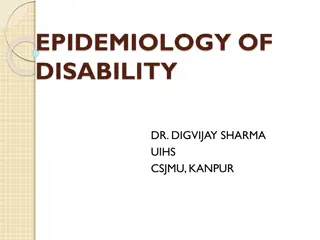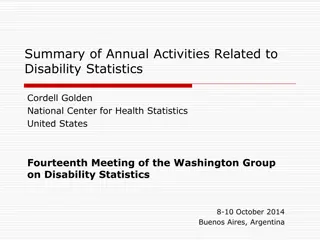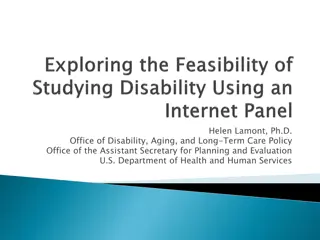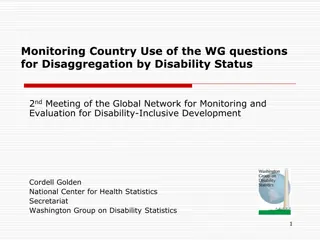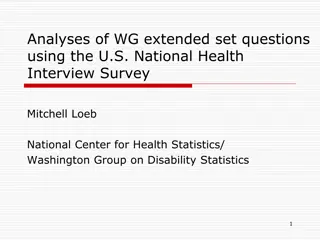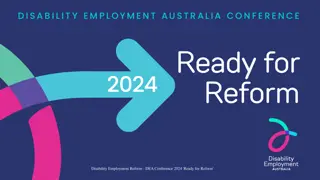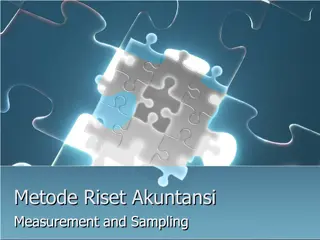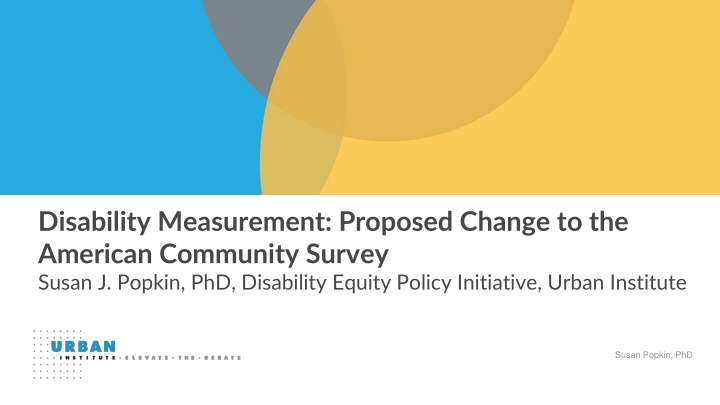
Proposed Change to Disability Measurement in American Community Survey
The Census Bureau's proposed change from ACS-6 to WG-SS for disability measurement faces challenges as it underestimates various types of disabilities. This shift could impact policy decisions and federal funding allocations affecting the disabled community.
Download Presentation

Please find below an Image/Link to download the presentation.
The content on the website is provided AS IS for your information and personal use only. It may not be sold, licensed, or shared on other websites without obtaining consent from the author. If you encounter any issues during the download, it is possible that the publisher has removed the file from their server.
You are allowed to download the files provided on this website for personal or commercial use, subject to the condition that they are used lawfully. All files are the property of their respective owners.
The content on the website is provided AS IS for your information and personal use only. It may not be sold, licensed, or shared on other websites without obtaining consent from the author.
E N D
Presentation Transcript
Disability Measurement: Proposed Change to the American Community Survey Susan J. Popkin, PhD, Disability Equity Policy Initiative, Urban Institute Susan Popkin, PhD
Overview The Census Bureau proposed a change to the disability questions in the American Community Survey from the current six-question measure (ACS- 6) to the Washington Group Short Set (WG-SS). This change would have cut the estimated number of disabled people in the United States by almost half. After a strong response from disability advocates, the proposal was paused in February. Underestimating the number people with disabilities would make it difficult to answer important policy questions and would likely affect federal funding allocations. 2
The Current ACS-6 Disability Measure Already Underestimates Disability The ACS-6 questions focus on functional limitations and activities of daily living (dressing, bathing, doing errands), but miss people with neurological disabilities, intellectual/developmental disabilities, psychiatric disabilities, and chronic illness. Researchers have estimated that this framework fails to identify almost 20% of people with self-identified, enduring disabilities (Hall et al 2022). Urban s DEPI team has encountered challenges using the ACS-6 in our research. For example, when using the CPS to investigate barriers that disabled people face in finding affordable housing. 3
Proposed Change to WG-SS Would Exacerbate the Underestimate of Disabled People The Census Bureau proposed a move to the WG-SS questions. Like the ACS-6, these questions also focus on activities of daily living and exclude many types of disability. Unlike the Yes or No response options of the ACS-6, the proposal would count only people who select serious difficulty on any of the 7items as disabled, excluding those who select some difficulty. The Census Bureau s own analysis shows that this change would drastically reduce the estimated number of disabled people by almost half (14% to 8%). 4
Potential Impact of Proposed Change: Policy and Funding It is difficult to know the full impact of the proposed change on federal funding, but we do know that ACS data informs hundreds of federal funding formulas. We were able to find some clear examples of ways that federal agencies use the ACS-6: Dept of Transportation, HUD, Low-Income Energy Assistance Program, CDC emergency planning, and FEMA measures of community resilience. ACS disability data is also used by State and local governments. 5
Potential Impact: US Department of Housing and Urban Development HUD uses ACS disability estimates to fund and evaluate programs like the Community Development Block Grant and the HOME Investment Partnerships Program. Compliance reviews for public housing agencies use ACS data to assess the need for accessible units in specific communities. HUD s American Housing Survey, the most comprehensive national housing survey in the country, collects data on disability status using the ACS-6. 6
Thank you! Contact: spopkin@urban.org 7








